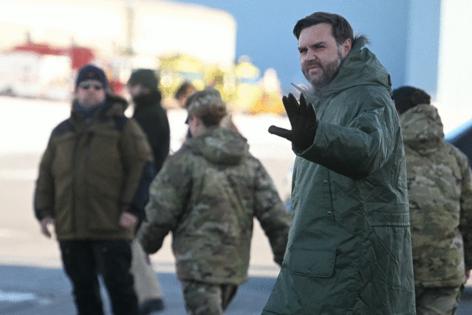Commentary: Trump's neo-colonialism tendencies ignore American history and values
Published in Political News
The United States had planned to send a delegation to Greenland, headed by Vice President JD Vance’s wife, Usha. But guess what? Greenland wasn’t having it, saying the visit was too provocative.
It’s a pattern. When President Donald Trump talks about buying Greenland, taking over Canada, or getting back the Panama Canal, it makes people think of the “Ugly American” — a reference to when Americans act loudly, self-centered and nationalistically while they travel abroad.
“The very aggressive American pressure against Greenlandic society is now so serious that the level cannot be raised any higher. The only purpose is to demonstrate power over us, and the signal is not to be misunderstood,” Greenland’s then prime minister, Mute B. Egede, told a local paper. The president will not let up despite Greenland’s determination to remain independent.
Even if Trump is beating his chest and telling everyone he is the alpha male in the room, his tone and intent come off as dismissive of national sovereignty and self-determination. This undermines U.S. moral authority — the legacy upon which this country has led international alliances and promoted democracy globally.
Indeed, Russian President Vladimir Putin watches with glee. Trump’s rhetoric emboldens other expansionist regimes — ones who tell their domestic audiences that Western civilization is crumbling. While the United States has yet to invade Canada, Greenland or Panama, Trump told Congress that “one way or the other, we’re going to get it,” referring to Greenland.
Notice the similarities between Putin and Trump? They both believe that borders can be modified or that the strongest nation is always justified. They also make claims about their “historical right” to the land or have reasons for wanting to control it. And both men ignore international rules and flaunt the use of military power to get what they want.
The United States has always had a moral compass. However, the country’s actions of late may encourage authoritarian regimes to dismiss national rights and pursue their territorial desires. It’s a sad change, and now the United States risks isolation not on its terms but on those of its international partners.
I spent eight days in Panama last September, covering the Panama Canal, its rainforests and its climate efforts. I interviewed dozens of people — from high-ranking national officials to internationally acclaimed scientists to historians. Like all Latin American countries, Panama opposes neocolonialism, where outsiders exercise a dominant influence, either economically or militarily.
In 1903, the country declared its independence from Colombia. From 1903 until 1999, the United States effectively controlled the Panama Canal Zone, which led to feelings of subjugation and resentment among Panamanians. After the Panamanians gained control over the canal, they invested billions to expand it.
Currently, Trump has reignited an old issue: the concept of “gunboat diplomacy.” Ironically, he might benefit from revisiting high school history to better understand this country’s commitment to the Monroe Doctrine and our longstanding dedication to preventing colonization in the Western Hemisphere.
What purpose does Trump’s bluster serve, especially because world leaders have figured out his tactics? He’s not planning to buy Greenland but pushing his limits and seeing who’s on his side. Most Americans value their independence and freedom from foreign invaders. It’s baked into the Declaration of Independence and the Constitution.
“Beyond geopolitical considerations, the Panama Canal region is an environmental treasure, home to diverse ecosystems and wildlife,” said Eduardo Reyes, international adviser on climate change negotiations. “Conflict in this area could lead to environmental degradation, threatening these precious natural resources.”
To his base, though, Trump’s gestures are bold and unapologetic. If Trump smells blood, he goes in for the kill — gets a deal he can label a “win,” whether it is mineral rights, military bases or economic dominance.
Most leaders see Trump as a circus act that makes a mockery of foreign policy. They don’t admire him in the usual diplomatic way, but they respect his power and the danger he could pose to the world order. To avoid trouble, they’re willing to toss him some treats to avoid a public scene — or until America returns to normalcy.
_____
ABOUT THE WRITER
Ken Silverstein has covered energy and international affairs for years. He wrote this for InsideSources.com.
_____
©2025 Tribune Content Agency, LLC.




























































Comments